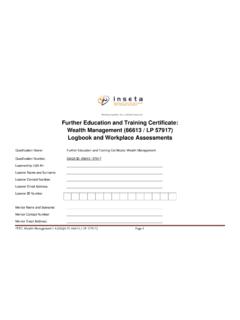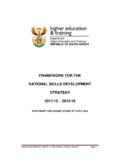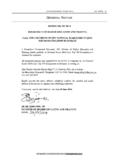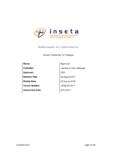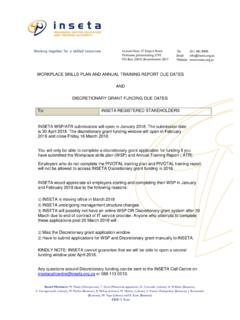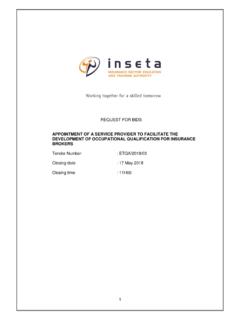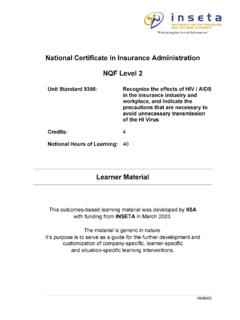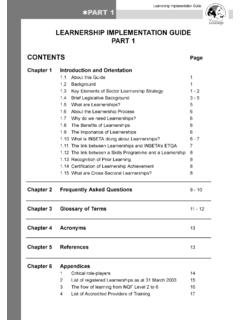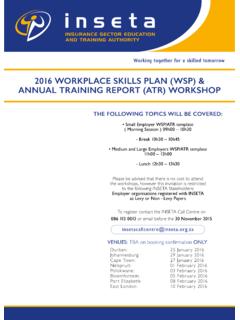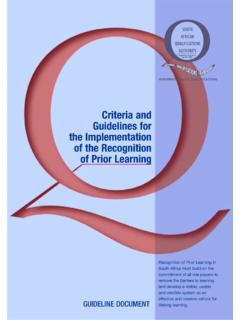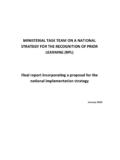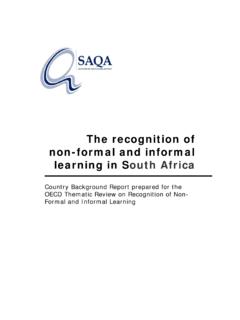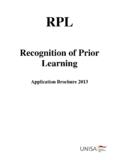Transcription of INSURANCE QUALIFICATIONS EQUIVALENCE …
1 INSURANCE QUALIFICATIONS EQUIVALENCE matrix FOR recognition OF prior learning If you cannot find your qualification or have any queries, please contact Outlearning on (011) 461 0627 for clarification, or e-mail 1. PREAMBLE a) Background Sparked by the Financial Advisory and Intermediary Services (FAIS) Act (2002), specifically its Fit and Proper Determination that was gazetted on 12 September 2003, the INSURANCE Sector Education and Training Authority (INSETA) commissioned Outlearning (Pty) Ltd to conduct a QUALIFICATIONS EQUIVALENCE Mapping exercise. The aim of this project was to determine the status of all historical and current formal QUALIFICATIONS available to industry practitioners and to create an EQUIVALENCE map between these QUALIFICATIONS and the unit standards that have been generated for the INSURANCE sector. Conducted between 11 September 2003 and 10 November 2003, a total of 132 QUALIFICATIONS that relate to the INSURANCE industry were mapped to unit standards and published as a matrix .
2 This pioneering initiative by INSETA is, arguably, a world-first and was inspired by a determination to provide support and assistance to industry stakeholders. Cognisant of the fact that the promulgation of similar legislation contributed to major drawbacks in the financial advisory and financial services sector in England and Australia, where many practitioners were forced to leave the industry, the compilation of an EQUIVALENCE mapping tool is bound to prove extremely beneficial to South African INSURANCE -industry stakeholders. However, to guarantee currency, there is a need to regularly update the baseline document produced as new QUALIFICATIONS and/or providers are accredited, and new unit standards are written. b) Philosophy The underlining philosophy that guided the entire project was the need to create a user-friendly QUALIFICATIONS EQUIVALENCE matrix that not only incorporated INSURANCE -specific QUALIFICATIONS but broad-based banking and financial QUALIFICATIONS that have relevance to the financial advisory sector.
3 There was also the need to ensure inclusivity so that all sectors ranging from Short-Term INSURANCE to Health to Collective Investments were incorporated. To guarantee the impartiality of the entire process, Outlearning, an independent company specialising in research, was contracted to conduct the EQUIVALENCE mapping. Outlearning strove to ensure that in embracing the principle of inclusivity, adequate pathways were created for Previously Disadvantaged Individuals (PDIs) who may not have met the entry-level stipulations of Fit and Proper. The once-off RPL assessment (to be conducted from 28 February 2004 to 6 March 2004 except 29/02/04) represents one such pathway for all stakeholders that may not satisfy the minimum legislated requirements. To further assist INSURANCE industry practitioners and in anticipation of a multitude of queries, Outlearning will also operate a Call Centre that will be contactable at either of the following numbers: (011) 461-0627; or, (011) 461-0624 Finally, there was also the need to ensure that the end-product was aligned to all SAQA (South African QUALIFICATIONS Authority) rules, regulations and requirements.
4 Consequently, the EQUIVALENCE matrix was subject to an exhaustive and stringent quality assurance and audit process that was overseen by an INSQA team led by Shirley Steenekamp, Manager of the INSURANCE Sector Quality Authority (INSQA) c) Practical Implications As far as could be ascertained, the methodology* adopted by Outlearning would have identified all existing industry-related QUALIFICATIONS . If this was not achieved, the matrix could be expanded to include valid QUALIFICATIONS . It is also highly recommended that all industry practitioners undertake next year s RPL assessment for any of the following considerations: to obtain the minimum entry-level qualification of 12 or 30 credits to update and refresh existing knowledge to obtain an additional 12 or 30 credits towards the eventual 30 or 60 required in Column 4 within the next two or three years. Ultimately, though, practitioners who do not take advantage of the opportunities for compliance which are made available to them, will not be allowed to practise as financial advisers, especially if they are Key Individuals.
5 * Outlearning s methodology included: - Working with key role-players such as the Financial Services Board, INSURANCE Institute of South Africa and Financial Planning Institute to compile a listing of formal QUALIFICATIONS - Advertisements (run over three weeks) in the Sunday Times and Saturday Star inviting information regarding relevant QUALIFICATIONS - Use of the Financial Planning Institute s database to extract relevant QUALIFICATIONS for inclusion in the EQUIVALENCE Mapping exercise - Alignment of all QUALIFICATIONS with existing unit standards - Presentation of a draft matrix to industry stakeholders for comment and, where necessary, a concomitant review of the matrix . - Sign-off from all parties. d) Factors Guiding Certain Decisions Historical QUALIFICATIONS proved difficult to align with existing unit standards in certain instances, unit standards that cover all training within the sector have not yet been written. In some cases, special dispensation was granted by INSQA as provided for by SAQA requirements.
6 The disappearance of many tertiary institutions from the South African educational landscape or their merger with other institutions also impacted on the EQUIVALENCE Mapping process. Short-courses and in-house training provided by INSURANCE companies were excluded from the process. International QUALIFICATIONS were also excluded because they proved difficult or impossible to map. In recognising these difficulties, SAQA has established a Centre for Evaluation of Educational QUALIFICATIONS (CEEQ) to deal exclusively with overseas QUALIFICATIONS and their mapping against the South African National QUALIFICATIONS Framework. Applications for the mapping of international QUALIFICATIONS will be entertained on their individual merit, and the process can be initiated by visiting the SAQA website at In the top right hand corner of the home page, a menu item labelled : Evaluation of Foreign QUALIFICATIONS will lead to a download page with the necessary information and application forms.
7 Please note that the CEEQ division of SAQA does not entertain telephonic or e-mail applications. Public queries pertaining to QUALIFICATIONS are to be directed to Outlearning at the aforementioned Call Centre numbers or, by email, to: It must be remembered, though, that the final responsibility for decisions relating to the validity of QUALIFICATIONS rests with the FSB, and not with INSETA or Outlearning. Industry practitioners need to bear in mind that they will no longer be allowed to operate in the financial advisory sector without formal QUALIFICATIONS and due attention needs to be focussed on this aspect of their professional lives. 2. STATEMENT BY THE INSURANCE SECTOR QUALITY AUTHORITY (INSQA) SAQA has accredited the INSURANCE Sector Quality Authority (INSQA) as having the capacity to perform quality assurance in the INSURANCE sector. INSQA has been accredited by SAQA to accredit providers of INSURANCE -specific full QUALIFICATIONS and short learning programmes based on either unit standards-based QUALIFICATIONS and/or non-unit standards-based QUALIFICATIONS .
8 The short courses and/or skills programmes indicated with an *(asterisk) fall into the category of short courses which are accredited by INSQA, as per the paragraphs above. Short Courses that provide credits towards registered unit standards and QUALIFICATIONS require quality assurance. Regulation of short course provisioning is only needed where this may have an impact on the award of credits towards particular unit standards and QUALIFICATIONS . All short course providers have been referred to INSQA to be accredited. INSQA has been accredited by SAQA to accredit short courses offered through, by and for the INSURANCE Industry. Short course provisioning is used to describe the type of provisioning which is considered to be short learning programmes, including what are known as short courses and skills programmes. INSQA accredits providers as having the capacity to provide education and training against specified unit standards and QUALIFICATIONS . A credit-bearing short course is a short training programme for which credits in relation to its contribution to a particular programme, unit standard and/or (part) qualification , are awarded.
9 A credit-bearing short course contains less than 120 credits. A short learning programme focuses on a particular part of a qualification which may include learning in the fundamental or core or elective areas (or a combination thereof), but will not lead to the achievement of the full qualification . 3. QUALIFICATIONS EQUIVALENCE MAP If you cannot find your qualification or have any queries, please contact Outlearning on (011) 461 0627 for clarification or e-mail Guide to the use of the Document and its Interpretation Scroll down the left hand column and find the name of the Institution which issued your qualification The INSURANCE Institute of SA. Find the specific qualification in column 2, Certificate of Proficiency (CoP) in Short-term INSURANCE . Go to Column 4 (SAQA EQUIVALENCE ) and see if any EQUIVALENCE credits have been granted. Please note that industry association memberships are not seen as a qualification . For instance, if you are an Associate Financial Planner (AFP) or Registered Financial Planner (RFP) member of the FPI, your qualification will be the underlying tertiary qualification OR having passed all the required examinations pertaining to the membership conditions.
10 The same applies to International memberships of professional bodies, for instance the ACII and FCII which are administered by the CII. In the case of the CII QUALIFICATIONS , the IISA ( INSURANCE Institute of South Africa) can assist in mapping the CII QUALIFICATIONS against IISA QUALIFICATIONS . For enquiries regarding CII, ACII and FCII, Contact Helena Barry at 011 274 8400. B Com Degrees and Financially related Postgraduate Diplomas/Certificates issued by Universities and Technikons are given blanket coverage in the first 2 sections of the EQUIVALENCE Tables. Validity of tertiary QUALIFICATIONS is a policy decision made by the FSB and all enquiries should be directed to them (Warren Neale of the Financial Services Board on 012 428 8000). Please note that incomplete tertiary QUALIFICATIONS where only the first year subjects of a three year degree/diploma have been passed, will not be awarded any credits. QUALIFICATIONS issued by International bodies with a presence outside South Africa, have been mapped as far as possible.
